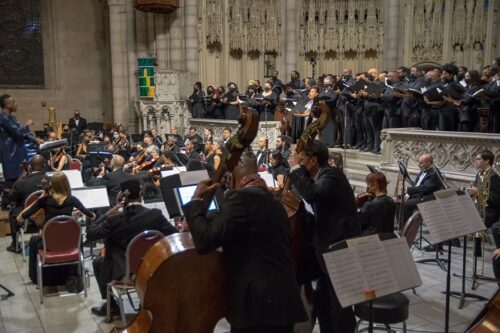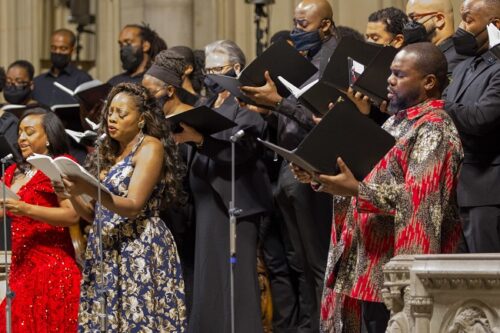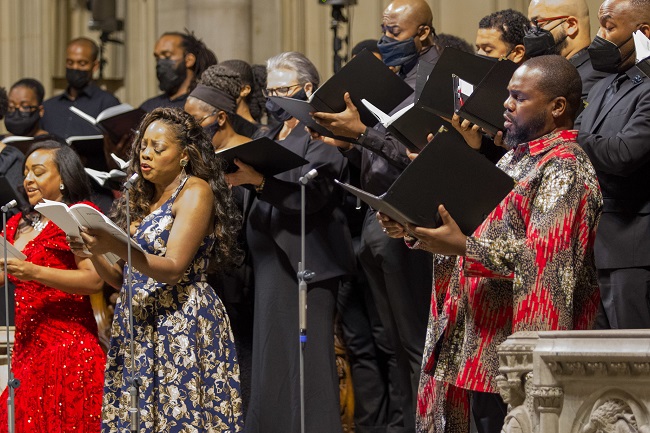 United States Various: Soloists, Chorale Le Chateau, The Harlem Chamber Players / Damien Sneed (conductor). Riverside Church, New York, 17.6.2022. (DS)
United States Various: Soloists, Chorale Le Chateau, The Harlem Chamber Players / Damien Sneed (conductor). Riverside Church, New York, 17.6.2022. (DS)

J. Rosamund Johnson (arr. Damien Sneed) – ‘Lift Every Voice and Sing’
J. S. Bach – ‘Herr Gott, dich loben wir’
R. Nathaniel Dett – The Ordering of Moses
Cast: Janinah Burnett. Brandie Sutton (sopranos), Krysty Swann (alto), Chauncey Packer (tenor), Kenneth Overton (baritone)
When a performance and its venue share a message, the concert experience is often spectacularly elevated in meaning. In just such a way, the Juneteenth performance of Robert Nathaniel Dett’s The Ordering of Moses at Riverside Church symbolized a confluence of decades of enduring hard work from emancipation to civil rights to the heroic ongoing efforts for social justice everywhere. Riverside Church famously held Martin Luther King in its pulpit for his ‘Beyond Vietnam’ speech and, later, Nelson Mandela with his address to the nation. On the weekend commemorating the freedom of enslaved people in the United States, Dett’s work embodied the deliverance, resilience and glory of this time in history with pomp and musical fervor that reach across ages and nations.
The Ordering of Moses (1932) is a 15-movement oratorio based upon the story of young Moses the shepherd that reveals the awakening of a leader to release his people. The grand opus is easily comparable to such oft-heard oratorio works as the fan-favorite Carmina Burana by Carl Orff – which was written just a few years later in 1935-36. Dett’s colossal work is compositionally, performatively and emotionally an equal to the Orff, and it requires a cast of solo singers who must live up to his musical palette of demands.
So why have you likely not heard this canon-worthy American work? Why have you, perhaps, not even heard of Dett, despite his accolades from Oberlin, Eastman School of Music and Harvard; and his connection to pedagogue Nadia Boulanger, among many others? In 1937, the first radio broadcast of this work aired on NBC, but it was cut short three-quarters of the way through. No satisfying explanation was given, though it is easily inferred that Dett’s glorification of the freedom of the enslaved with powerful use of the spiritual ‘Go Down Moses’ flawlessly woven into nineteenth-century classical structures triggered discriminatory censorship. Since then, there have rarely been any major performances until 2014 at Carnegie Hall.

In the grand Riverside Church, The Harlem Chamber Players performed with full chorus and top Metropolitan Opera singers under the baton of the uncompromisingly vibrant Damien Sneed. The concert opened with Sneed’s arrangement of ‘Lift Every Voice and Sing’ – a tune familiar to those like me brought up in the music of the southern Episcopal church, who sometimes lack an awareness that it is, in fact, the Black National Anthem. Soprano Janinah Burnett glowed in a silver gown as her voice released the solo line beyond the massive chorus in a brilliant, effortless flow of hypnotizing expression.
The production included dancers from Harlem School of the Arts. During the final third of the piece, pairs of dancers as well as groups of children performed with colorful ribbons up and down the aisles. While this was not part of Dett’s composition, it was somehow fitting as a great celebration that The Ordering of Moses was brought back to the stage, to a packed audience. It allowed for the joyful inclusion of youth and children.
Daniele Sahr
(The performance was introduced by Terrance McKnight, host at New York’s WQXR, and it will be aired at a future date.)
